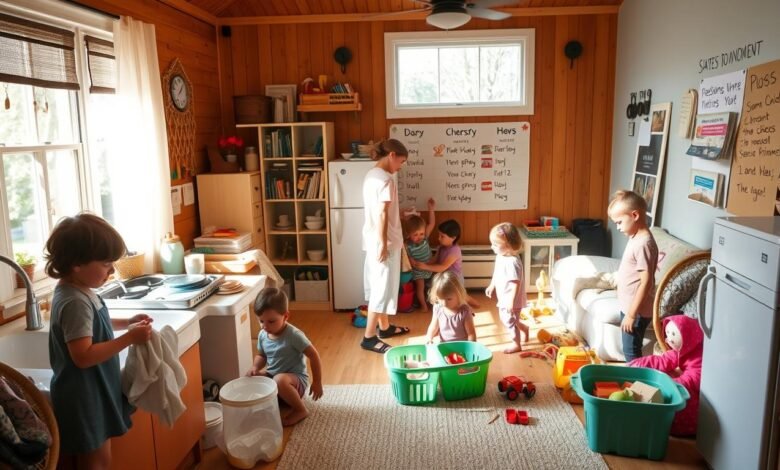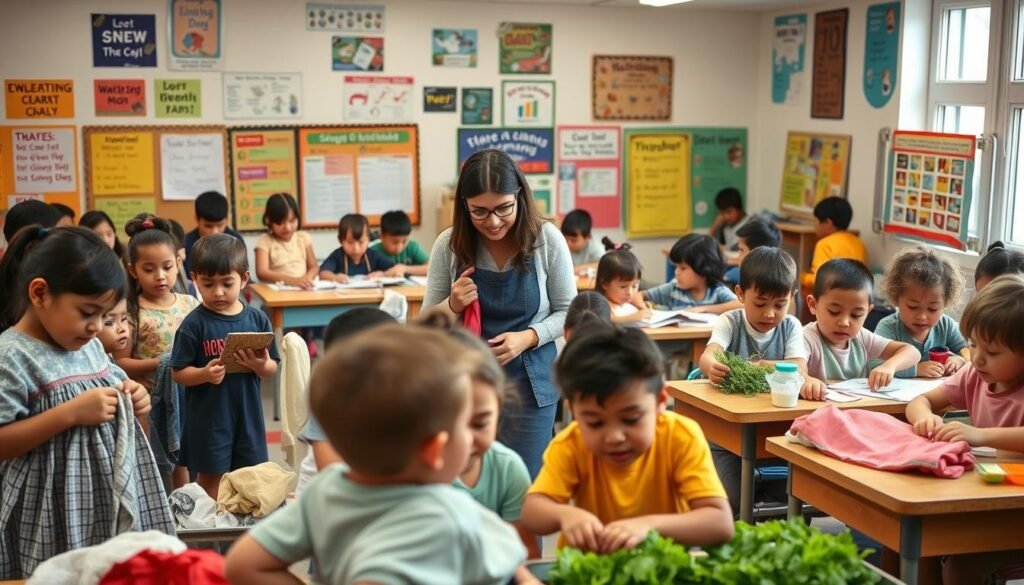Teaching Kids Responsibility: Age-Appropriate Chores for Every Stage

Did you know preschoolers can help with simple tasks? This starts a teamwork culture at home. It’s a great way to teach kids responsibility, which is key for their growth. As a parent, you aim to raise kids who can care for themselves and help at home.
Assigning chores based on age is a top parenting tip. It helps kids learn important life skills and feel responsible. For example, kids aged 5-7 can start with tasks like making their bed, setting the table, and sorting laundry.
As they grow, they can handle more tasks. This includes vacuuming, helping with dinner, and putting away groceries. Using chore charts or checklists helps keep things consistent and reminds kids of their tasks.
Remember, kids do better with encouragement and praise. Keep their tasks realistic and don’t give them too much. This way, they’ll feel responsible and grow into independent individuals. Teaching kids responsibility is a vital part of parenting.
Understanding the Importance of Responsibility in Child Development
As a parent, you have a big role in shaping your child’s personality and behavior. Teaching responsibility to children is key. It helps them learn important life skills like self-reliance, self-discipline, and self-confidence. By using positive reinforcement and teaching character, you can make your child more independent and confident.
Studies show that kids who do chores early do better in school and life. For example, a study found that starting chores at ages 3 or 4 is a strong predictor of success in young adults. This shows why teaching responsibility early is so important.
What Does Responsibility Mean for Kids?
Responsibility means taking care of oneself and one’s things, helping at home, and being accountable for actions. Teaching these values helps kids develop a sense of responsibility that lasts a lifetime. For instance, kids who do chores are 50% more likely to feel responsible by age 10.
Long-Term Benefits of Teaching Responsibility
Teaching responsibility to children has many long-term benefits. Responsible kids do well in school, excel in activities, and are better at solving problems. They also learn important skills like managing money, taking care of a home, and respecting others. By teaching responsibility early, you prepare your child for a successful and confident future.
| Age | Benefits of Teaching Responsibility |
|---|---|
| 3-4 years | Better academic performance, success in careers and personal relationships |
| 5-10 years | Development of essential life skills, such as self-reliance, self-discipline, and self-confidence |
| 11-17 years | Improved problem-solving and decision-making skills, respect for others, and social responsibility |
Age 2-4: Simple Tasks for Toddlers
At this age, you can start introducing simple tasks. These help your child develop their fine motor skills and hand-eye coordination. Chores like putting away toys and helping with laundry make your toddler feel more independent and confident. It’s important to start fostering independence in kids with these small tasks.
Research shows that even before they turn 2, toddlers want to help. They are motivated by the praise they get from adults. Engaging toddlers in chores improves their practical skills, like cleaning up and sorting laundry. Here are some examples of simple tasks suitable for toddlers:
| Age | Chores |
|---|---|
| 2-year-olds | Putting away toys, carrying plastic dishes to the sink, dropping dirty clothes into the hamper |
| 3-year-olds | Dusting window sills, wiping up spills, helping with laundry by pairing socks |
| 4-year-olds | Folding clothes and putting them away, pouring drinks into cups for mealtimes |
By introducing these simple tasks, you can help your child feel responsible and disciplined. It also helps them become more independent. Always use positive reinforcement, like stickers or small rewards, to motivate your toddler to do their chores well.
Age 5-7: Encouraging Independence
As your child grows, they become more independent and self-sufficient. This is an exciting time. With the right parenting tips, you can encourage this growth and teach responsibility.
At this age, kids can take on more responsibilities. They can make their bed, help with simple meals, and assist with pet care.
Instilling values in kids is key during this stage. By giving them age-appropriate chores, you teach them responsibility. This also helps them feel self-worth and confident. The American Academy of Pediatrics says kids around ages 5 and 6 are ready for drop-off play dates. This shows they can handle more independence.

Some chores for early learners include loading the dishwasher, washing dishes, and caring for houseplants. These tasks help them develop responsibility and social and emotional skills. By encouraging independence and teaching responsibility, you’re setting your child up for success.
Remember, finding a balance is important. You want to give your child independence while they learn valuable life skills. With the right approach, your child will grow into a confident, responsible, and compassionate individual. By following these parenting tips and instilling values in kids, you’ll be well on your way to raising a happy and successful child.
Age 8-10: Fostering Teamwork and Accountability
Kids at this age start to work well with their siblings. They learn teamwork and accountability. You can help by giving them chores to do together, like cleaning or cooking.
These activities teach them important skills like talking well, solving problems, and managing time. It’s a great way to build their character and sense of responsibility.
It’s also important for kids to learn how to manage their time. You can make a schedule or a chart for chores. This helps them stay on track and feel responsible for their tasks.
Collaborative Chores with Siblings
Chores that need teamwork, like cleaning or cooking, are great for kids. They learn to communicate and solve problems together. It also teaches them to rely on each other and feel accountable.
Learning Time Management Skills
Teaching kids to manage their time is key. You can help them sort out their tasks and stay organized. This builds their sense of responsibility and gets them ready for bigger challenges later.
Age 11-13: Preparing for Adolescence
When your child hits the preteen years, they often want more freedom. They might pull away from you. It’s normal and important to keep teaching them responsibility.
Teaching values like self-reliance and discipline is key. These skills are vital for their future.
Building character is critical at this age. They start to form their own identities and make choices that shape their future. Encourage them to do more around the house. Tasks like cleaning their room and helping with laundry are great.
It’s vital to keep talking openly with your child during this time. Make sure they feel safe sharing their thoughts and worries. This way, you can help them grow into responsible and well-rounded individuals.
Age 14-17: Transitioning to Young Adulthood
As your child enters the 14-17 age range, they’re moving into young adulthood. This time is key for learning real-world skills, like managing money and understanding finance. Teaching kids responsibility helps them develop important life skills like being self-reliant and disciplined.
Research shows that most males grow a lot between 14 and 17. Their brains also grow a lot, focusing on areas that help with planning and controlling impulses. By teaching your teen to be independent and accountable, you help them grow into a responsible and strong individual.
Real-World Responsibilities Teens Should Learn
At this age, teens can handle more complex tasks. They can manage their money, help with household chores, and learn about finance. Teaching them character is vital, as it helps them understand themselves and prepares them for adulthood. Giving your teen chances to learn and grow makes them responsible and capable.

Financial Literacy: Chores with a Purpose
Teaching your teen about money is key for their future. By making chores meaningful, like paying them for tasks or helping with bills, you teach them money’s value. This way, they learn to work hard and make smart money choices.
| Age | Responsibilities | Parenting Tips |
|---|---|---|
| 14-17 | Managing finances, household tasks, financial literacy | Encourage independence, accountability, and character building |
Strategies for Parents to Teach Responsibility
As a parent, you have a big role in teaching your kids responsibility. Positive reinforcement is a great way to encourage good behavior. It helps your kids feel accountable. By using parenting tips, you can help your kids become more independent.
Creating a chore chart is another good strategy. It helps your kids stay organized and focused. You can also track their progress and give feedback, which is key to learning.
Here are some more tips to teach responsibility to your kids:
| Tips | Description |
|---|---|
| Lead by example | Show your kids what it means to be responsible by demonstrating responsible behavior yourself. |
| Set clear expectations | Communicate your expectations clearly and make sure your kids understand what is expected of them. |
| Provide positive feedback | Encourage your kids by providing positive feedback and recognition for their efforts and achievements. |
The Role of Consistency and Routine
Teaching kids responsibility is easier with consistency and routine. Consistency makes kids feel safe and less anxious about sudden changes. By creating a schedule for chores, kids learn to be accountable and responsible. This is key for their character development, showing them that their actions matter.
Studies prove that regular routines are vital for kids’ social and emotional growth. For instance, regular sleep times help kids feel secure and get enough rest. Consistent routines teach kids to cooperate, be patient, and empathetic.
To create a chore schedule, first list the tasks and assign them to specific days and times. Make sure to clearly tell kids what’s expected and praise them when they do their chores. By teaching kids responsibility and sticking to your rules, you help them build skills for life success.
| Age Group | Benefits of Consistency |
|---|---|
| Toddlers (1-3 years) | Regulate sleep patterns, support growing independence |
| Preschoolers (3-5 years) | Foster social skills, support structured group interactions |
| Early school-age children (6-8 years) | Support managing responsibilities, develop time-management skills |
By sticking to these tips and keeping routines consistent, you can help your kids grow into responsible individuals. Be patient, communicate well, and always give positive feedback to support their development.
Encouraging Motivation and Accountability
Teaching kids responsibility is key. You can do this by using positive ways to encourage them. Praise, rewards, and recognition are great tools. For example, a chore chart with rewards can really help.
It’s also important to show them the effects of their actions. Losing privileges or facing natural consequences teaches them responsibility. This way, they learn to be self-reliant and disciplined. Remember, teaching responsibility is a long-term effort that needs patience and consistency.

Here’s a simple table to illustrate the benefits of encouraging motivation and accountability in kids:
| Benefits | Results |
|---|---|
| Increased self-esteem and confidence | 20% increase in self-esteem and confidence |
| Improved academic performance | 15% better academic performance |
| Developed sense of accountability and responsibility | 30% more likely to develop a sense of accountability |
By following these tips and using positive reinforcement, you can help your kids grow into responsible individuals. This will prepare them for success in life.
Adapting Chores to Each Child’s Personality
Every child is different, with their own strengths and interests. Teaching kids responsibility means tailoring chores to fit each child’s personality. This helps them feel responsible and motivated, which is key for their growth.
Research shows that 70% of parents believe chores help kids learn important life skills. This is a big part of teaching them responsibility.
It’s also important to understand how each child learns best. Some are visual, others auditory or kinesthetic. Tailoring your approach to their learning style makes a big difference.
For example, if your child is a visual learner, use pictures or diagrams on a chore chart. This helps them stay organized and focused. It’s a great way to teach them.
Assigning tasks based on their interests makes chores more fun. If your child loves animals, give them pet care tasks. This teaches them responsibility and helps them care for another living being.
By adapting chores to each child’s personality, you help them develop important life skills. These skills are essential for their future success.
Next Steps: How to Monitor Progress
Teaching responsibility to children is a big step. It’s important to watch their progress and offer support. Regular talks and feedback can help them stay on track. Using tools like chore charts and clear expectations can also help.
Building character in kids takes time and effort. Celebrate their achievements to keep them motivated. Simple praise for doing chores or helping others can go a long way.
It’s key to regularly check in and give feedback. Use tools like progress sheets and peer reviews to track their growth. This helps you see where they need more help and guide them better.
Teaching kids responsibility is a long-term effort. With patience and the right support, they can grow into responsible adults. Start monitoring their progress today and watch them thrive!
Conclusion: The Lifelong Benefits of Responsibility
As we wrap up our look at chores for kids, it’s clear that teaching
responsibility
is a priceless gift. Kids who learn to be responsible grow into successful adults. They gain important skills like self-reliance, self-discipline, and self-confidence.
Parenting tips
show that kids should start helping out at home early. Studies say kids who do chores have better self-esteem and emotional control. They also learn about money.
character building in children
By teaching responsibility, you help your child achieve great things in life.
Teaching responsibility isn’t always easy, but the benefits are huge. Keep going, be patient, and celebrate your child’s growth. With your help, they’ll become strong, caring people ready to face the world.
Source Links
- Age-Appropriate Chores for Children – https://www.healthychildren.org/English/family-life/family-dynamics/communication-discipline/Pages/Chores-and-Responsibility.aspx
- Age-Appropriate Chores for Children: Chore Ideas and Allowances – https://www.webmd.com/parenting/features/chores-for-children
- Teaching Kids Responsibility: Setting Them Up for Success – https://www.honorablecharacter.com/pages/why-it-s-important-to-teach-responsibility-setting-your-kids-up-for-success
- 9 Tips to Help Teach Your Child the Benefit of Responsibility – Early Advantage Child Care – https://www.earlyadvantagedcc.com/early-advantage-parent-resources/9-tips-to-help-teach-your-child-the-benefit-of-responsibility/
- The Crucial Role of Teaching Responsibility to Children – https://openmindscampus.co.za/teaching-responsibility/
- Age-Appropriate Chores for Kids: Teaching Your Toddler Responsibility – https://www.whattoexpect.com/toddler/behavior-and-discipline/chores-for-kids
- 25 Chores Your 2-4 Year-Old Should Be Doing (And How To Get Him/Her To Work) – Keeper of the Home – https://keeperofthehome.org/25-chores-your-2-4-year-old-should-be-doing-and-how-to-get-himher-to-work/
- 34 Age-Appropriate Chores for Toddlers – https://www.happiestbaby.com/blogs/toddler/toddler-chores
- How to Teach Kids Life Skills to Promote Independence and Confidence – https://confidentparentsconfidentkids.org/2023/04/06/how-to-teach-kids-life-skills-to-promote-independence-and-confidence/
- What Kids Can Do Themselves at Every Age – https://tinybeans.com/when-to-give-kids-independence/
- Chores for Kids: How to teach responsibility and earn money – https://www.modakmakers.com/learning/chores/chores-for-kids-how-to-teach-responsibility-and-earn-money
- 10 Best Responsibility Activities for Kids – https://mentalhealthcenterkids.com/blogs/articles/responsibility-activities
- 10 Tips for Parenting Preteens – Child Mind Institute – https://childmind.org/article/10-tips-for-parenting-your-pre-teen/
- Positive Parenting Tips: Middle Childhood (9–11 years old) – https://www.cdc.gov/child-development/positive-parenting-tips/middle-childhood-9-11-years-old.html
- Shifting responsibility to pre-teens and teenagers – https://raisingchildren.net.au/pre-teens/communicating-relationships/family-relationships/shifting-responsibility-teen-years
- Adolescent Development – https://my.clevelandclinic.org/health/articles/7060-adolescent-development
- Parent and Youth Priorities during the Transition to Adulthood for Youth with Special Health Care Needs and Developmental Disability – https://pmc.ncbi.nlm.nih.gov/articles/PMC4102311/
- How To Teach Your Kids To Own Their Mistakes – https://www.parents.com/teach-child-to-take-responsibility-5292014
- Teaching Responsibility to Children – https://centerforparentingeducation.org/library-of-articles/responsibility-and-chores/developing-responsibility-in-your-children/
- 15 Strategies To Help Kids Become More Responsible – https://www.peacefulparenthappykids.com/read/responsibility
- Why Structure and Consistency Are Important For Kids • Kids Creek Therapy – https://www.kidscreektherapy.com/why-structure-and-consistency-are-important-for-kids/
- The Importance of Routine for Children: Creating a Consistent Schedule – Childcare Network – https://childcarenetwork.com/the-importance-of-routine-for-children-creating-a-consistent-schedule/
- Teach Your Child Responsibility — 7 Tips to Get Started – https://www.empoweringparents.com/article/teach-your-child-responsibility-7-tips-to-get-started/
- 7 Ways to Encourage a Sense of Responsibility in Your Children – https://nybabysteps.com/blog/encourage-a-sense-of-responsibility/






